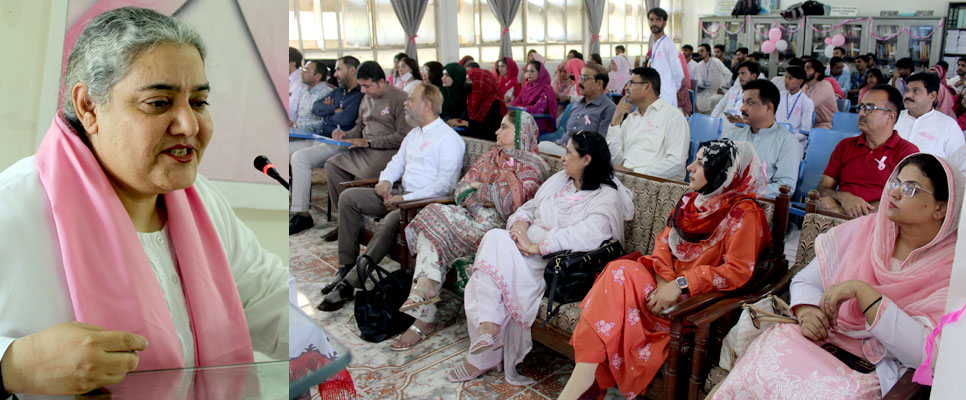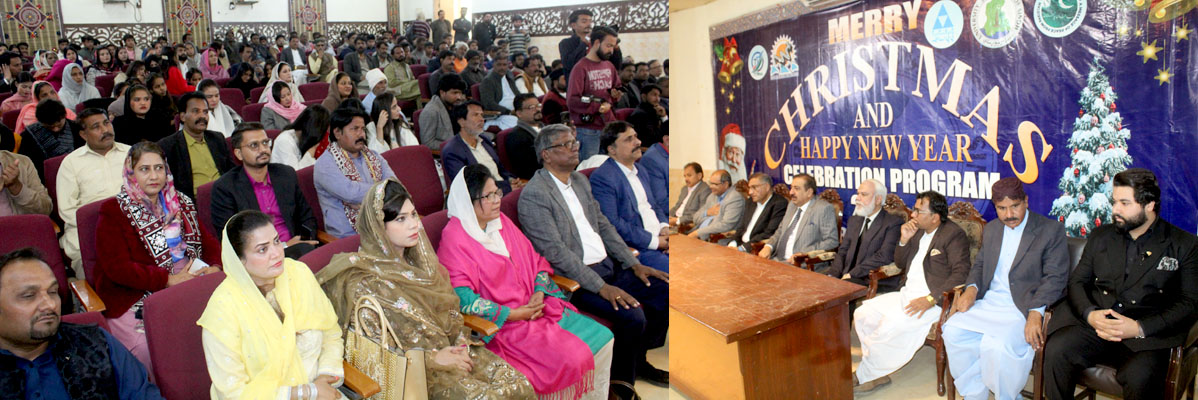
Doctors call for disseminating breast cancer awareness among male, female individuals as early detection of illness saves numerous lives
Health experts and doctors have underscored the critical importance of public awareness and early diagnosis in the prevention and management of breast cancer among both male and female individuals, urging citizens especially women to actively disseminate breast cancer awareness as early detection can save numerous lives.
They emphasized that while Pakistan witnesses around 90,000 new breast cancer cases annually, the disease has a survival rate of over 98% when diagnosed in the early stages making late diagnosis the primary cause of high mortality in the country.
This they said while addressing the breast cancer awareness seminar organized by Institute of Gender Studies (IGS), University of Sindh Jamshoro here on Tuesday. The experts said that October was recognized worldwide, including Pakistan, as breast cancer awareness month and revealed that the country diagnosed approximately 90,000 cases of breast cancer in women annually, primarily attributed to a lack of awareness and limited access to diagnostic facilities.
Addressing the seminar, Director of the institute Professor Dr. Misbah Bibi Qureshi emphasized the potential reduction in breast cancer incidence through heightened public awareness and early detection.
She reiterated the institute's commitment to fostering awareness through seminars and social media initiatives throughout the month.
Dr. Qureshi called for comprehensive societal support for women facing breast cancer, including the provision of free medications and advocated joint efforts to educate women on preventive measures and access to free medical camps.
Dr. Misbah Bibi Qureshi expressed concern over the rising prevalence of breast cancer in Pakistan and neighboring countries, projecting an upward trend based on demographic shifts. She stressed that early-stage identification significantly impacted the reduction of illness and mortality.
She acknowledged that mammographic screening was influenced by a range of socio-cultural and economic factors but highlighted that women in Pakistan often seek medical attention at advanced stages due to multiple socio-economic and cultural factors, including age, employment status, limited awareness, fear of surgery and reliance on traditional treatments and spiritual healing.
Director of the Office of Research Innovation & Commercialization (ORIC), Liaquat Medical University of Medical & Health Sciences (LUMHS) Jamshoro Dr. Binafsha Manzoor Syed noted the overwhelming prevalence of breast cancer in women, with a minimal occurrence in men. She urged women to conduct regular self-examinations for their well-being.
She pointed out that 89pc of breast cancer patients in the country were diagnosed at later stages, with 59% at advanced stages due to a lack of awareness.
She cited the fear of stigmatization and feminine sensitivity as barriers to early detection and treatment in low- and middle-income countries, discussing physical barriers, leading to psychosocial stress and reluctance for screening and treatment.
An Assistant Professor at the Department of Pharmacology, LUMHS, Jamshoro Dr. Sadat Memon highlighted that one in eight women in Pakistan developed breast cancer at some point in their lives and many succumbed to it each year due to a lack of awareness.
She emphasized the importance of open communication and regular breast examinations, not only among elderly women but also younger individuals.
Dr. Memon advised women to undergo a mammogram and physical examination by a doctor at least every two years, dispelling misconceptions about chemotherapy side effects.
Senior Lecturer in the Department of Pharmacology, LUMHS, Jamshoro Dr. Shamshad Memon emphasized that early-stage breast cancer typically presented with no symptoms and screening mammograms played a pivotal role in early detection.
She recommended annual screening mammograms for women over 40 and even earlier for those with family histories or risk factors.
Researcher Junaid Soomro identified the societal stigma and reluctance to discuss breast cancer as factors leading to delayed diagnosis, heightened complications and in some cases, fatality.
Advocating for mass awareness, he stressed the importance of educating women about signs, self-examination and diagnosis, a process that takes only five minutes.
The seminar witnessed a diverse gathering of male and female students, scholars and educators with notable attendees including Pro-Vice Chancellor Sindh University Main Campus Prof. Dr. Abdul Sattar Shah, Prof. Dr. Arfana Begum Mallah, Amar Sindhu, Dr. Najma Memon, Prof. Dr. Zulfiqar Leghari, Dr. Punhal Khan Soomro, Khalid Mirani, Dr. Muhammad Younis Leghari, Dr. Raza Shah, Dr. Sajo Mal, Dr. Aftab Rajar, Dr. Ameer Ali Buriro, Asma Kalhoro, Najma Gopang, Prof. Dr. Nek Muhammad Shaikh, Dr. Lachhman Das Dhomeja, Dr. Sanjhota Bai and Dr. Naheed Arain.


